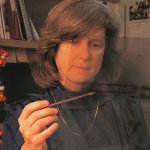research
September 1, 1997
Nurse midwives keep cost, Caesarean rates lower, study finds
Low-risk women who choose nurse midwives for their deliveries have fewer Caesarean sections, a UW study found.
Dollars shouldn’t define divorced dads, professor says
Social Work Professor Pauline Erera says that it's time to understand dads beyond the issue of dollars.
Weight-loss idea
UW researchers created a mouse that can eat fat and still lose weight, but can the results be transferred to humans?
July 1, 1997
‘Imagination inflation’ makes childhood events seem real, study finds
The power of human imagination may be stronger than previously suspected, blurring the line between memory and imagination.
June 1, 1997
Kincaid blaze destroys lab, burns evolution research
A zoologist's research went up in flames March 24 as a two-alarm fire caused more than $225,000 in structural damage to a fifth-floor laboratory in Kincaid Hall.
At research center, patients take on risk for the sake of a cure
From bone marrow transplants to cancer vaccines, patients in the Clinical Research Center opt for experiments that could save lives, maybe even their own.
Drugs, surgery show equal results for heart-attack patients in study
Heart attack patients show nearly identical survival rates, whether treated with powerful anti-clotting drugs or with balloon angioplasty, say UW researchers.
Hormones may place women at greater risk for facial pain
One reason why many more women than men suffer from problems with their jaws may be related to the role of female reproductive hormones.
March 1, 1997
Subliminal messages can affect cognition, researchers show
UW psychologists say there is some evidence that subliminal messages can affect human cognition.
Lab mice stay thin on a fast-food diet
UW scientists have produced a genetic mutation that keeps laboratory mice thin even on a very high-fat diet.
Crime rates are down; UW sociologists try to explain why
UW sociology professors say there are no easy answers to the mystery behind the falling crime rate.
December 1, 1996
Researchers work to create medical implants that bodies won’t reject
UW bioengineers hope to fool the body into accepting foreign materials, opening the door to artificial kidneys, bionic hip replacements and other medical miracles.
September 1, 1996
Mount Rainier poses top threat among Cascade volcanoes
Mount Rainier has moved to the top of the list of a UW scientist's most seismically hazardous Cascade volcanoes.
Mothers’ depression can affect babies’ brains
A mother's depression can have significant effects on her infant, UW Psychology Professor Geraldine Dawson reported.
Genes unlock the mysteries of the immune system
Scientists have uncovered some powerful and surprising information about the human immune system.
UW gifts, grants total a record $154.6 million
Private support for the UW reached an all-time high with more than $154.6 million contributed in gifts and private grants.
Inventions made for war adapted to heal people and help the planet
Figuring out how to provide aid during the critical "golden hour" has been the impetus behind a number of projects.

Cancer detective
After discovering the gene linked to breast cancer, Mary-Claire King now is on the hunt for ways to combat the disease.
June 1, 1996

Modern plagues
Once beaten by miracle drugs, infectious diseases are back and stronger than ever.
Women at greater risk of death after heart attack treatment
An international team of researchers found that women treated for heart attack with blood clot-dissolving drugs have a considerably greater risk of death and serious complications compared to men.